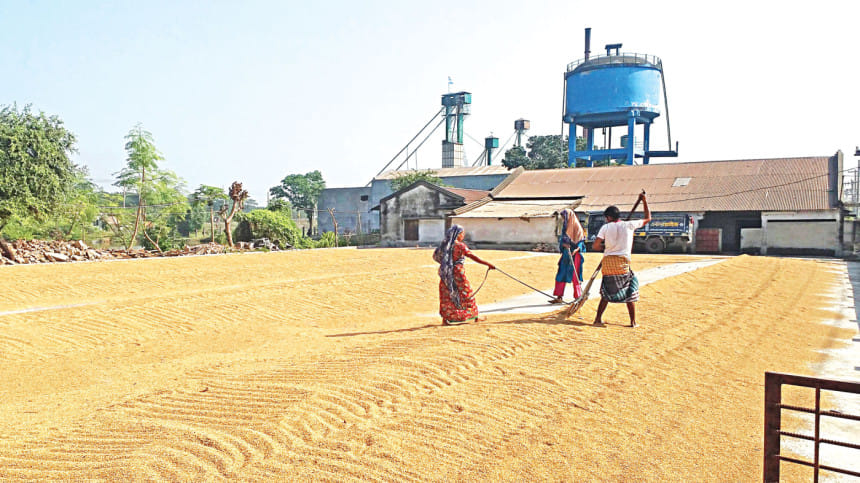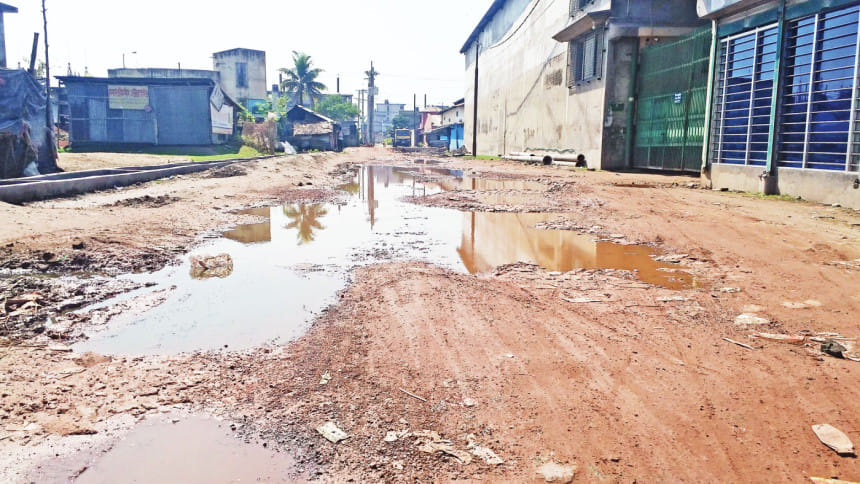Poor facilities plague industrial estate

The Bangladesh Small and Cottage Industries Corporation (BSCIC) industrial area in Bagerhat is failing to reach its full potential owing to the poor road condition, fresh water shortage and inadequate drainage system.
Twenty-seven years have passed since its establishment in the southwestern district town, but local industrialists are still irritated for the roads full of potholes, water shortage, and lack of adequate drainage system. As the problems are not addressed, the industrial estate is losing its appeal day by day.
Set up in 1995, the BSCIC industrial area is located on 21 acres of land along the Bagerhat-Pirojpur highway on the banks of the Daratana river in Bagerhat.
A decade ago, there were 57 industrial units in the 123-plot estate. But due to poor infrastructure and facilities, only 37 factories are operational now, employing 900 workers.
Among the businesses currently operating in the estate are auto rice mills, lentil mills, easy-bike assemblers, old plastic processors, coconut fibre mills, and coconut oil mills.

Mostafizur Rahman, chairman of National Fibre Choir Ltd, said there are big holes on the roads at the entrance of the estate.
"During rainy seasons, the roads go underwater. The same happens when the tidal water comes in. Most of the roads in the industrial estate have become unusable."
Emdad Ali Paik, the owner of Barkat Flour Mill, says due to the bad road condition, they are suffering while transporting goods.
"The cost is also high. Many factories are about to close due to losses."
Factories have had to deploy guards on their own, he said. "There are a number of entry points at the BSCIC industrial estate. So, at night we feel insecure."
Paki called for the development of infrastructure and the road system and an end to water and drainage problems.
Shiba Prosad Ghosh, president of the BSCIC Mills and Factories Owners Association, says there were at least 16 coconut oil mills at the start of the journey.
Later, more than 30 small and big factories, including those involved in processing oil, lentil, coconut shell mattresses, tin, and plastic were built, generating jobs for many.
"However, four out of five roads within the BSCIC area are now damaged."
Ghosh said despite repeated requests, the authorities are not renovating the roads. "The drainage system is totally damaged. So, we suffer terribly."
An owner of a factory says the facilities that existed at the beginning of the BSCIC industrial area are now lacking.
"During the monsoon season, there is usually knee-deep water on the roads. Drivers don't want to bring trucks. As a result, the transportation costs are increasing. As the drainage system is not wide enough, the water can't go out of the area smoothly."
Several factories are on the verge of closure for the lack of adequate facilities, he warned.
Rahman Molla, a worker at a factory in the BSCIC area, says the roads are in such a dilapidated condition that one would find it difficult even to walk.
"Rickshaw-pullers don't want to come even if someone offers them to pay double the actual fare."
The BSCIC earned Tk 2.43 crore from land leases between 1999 and 2021. Another Tk 1.7 crore was generated thanks to service charges, water bill and land taxes.
Md Sharif Sardar, acting deputy manager of the Bagerhat BSCIC Industrial town, admits that there has been an infrastructure problem for a long time.
"We have started working on these solutions."
He said the construction of the BSCIC gate and one road has been completed. The repair work of the damaged roads will be done in phases.
"In addition, the freshwater crisis will be resolved soon."
A tender to install the submersible pump at a cost of Tk 35 lakh has been completed.
"But the work is being hampered due to underground rocks and some design issues. The work to set up the pump will begin soon after the design revision. The renovation of the roads will complete before the next monsoon," Sardar added.

 For all latest news, follow The Daily Star's Google News channel.
For all latest news, follow The Daily Star's Google News channel. 



Comments